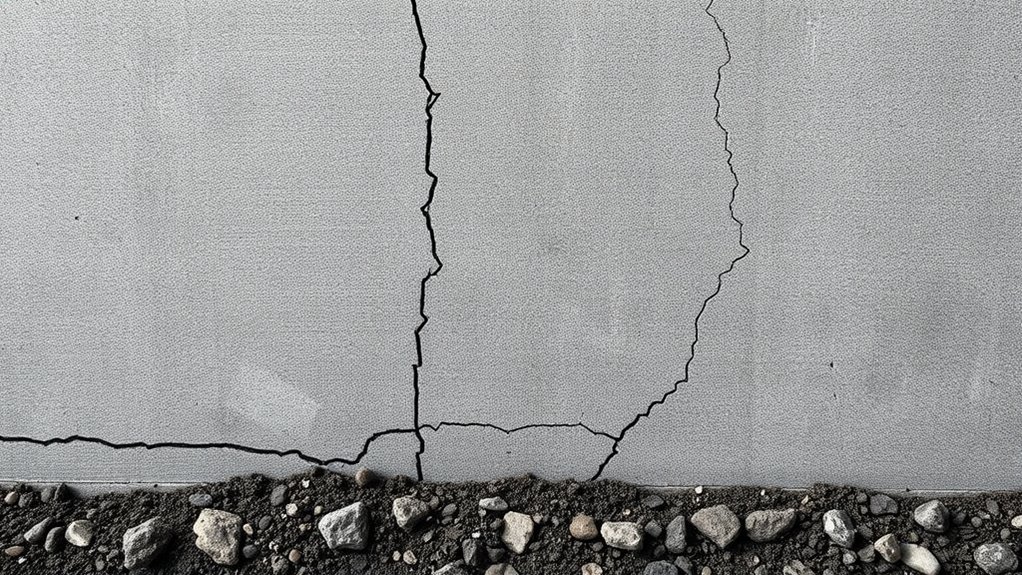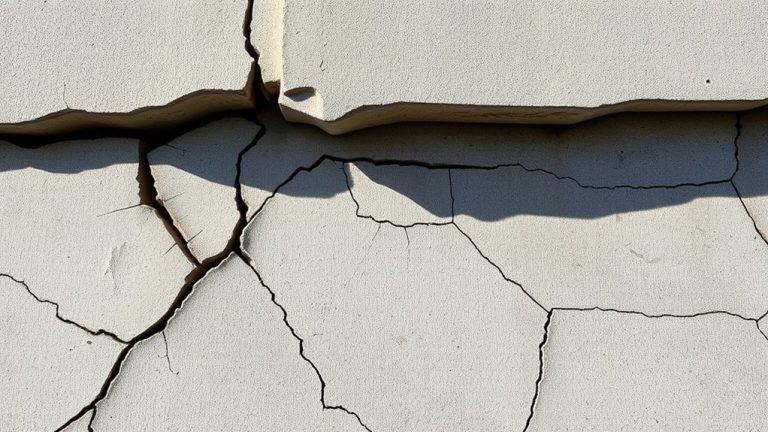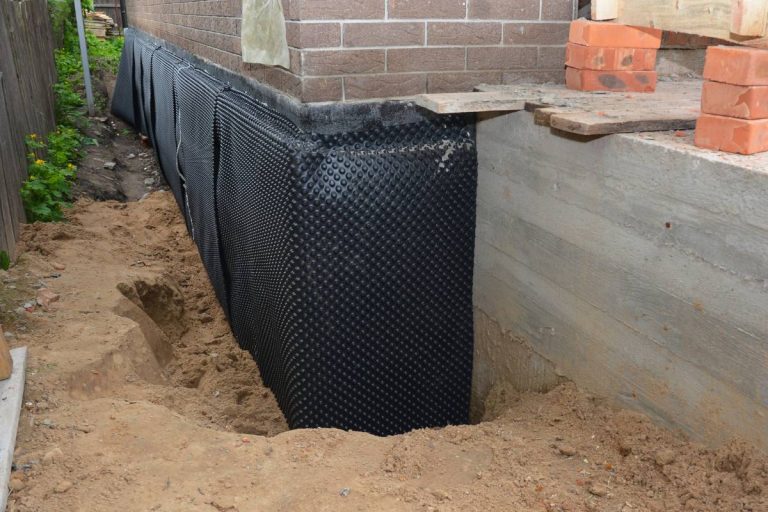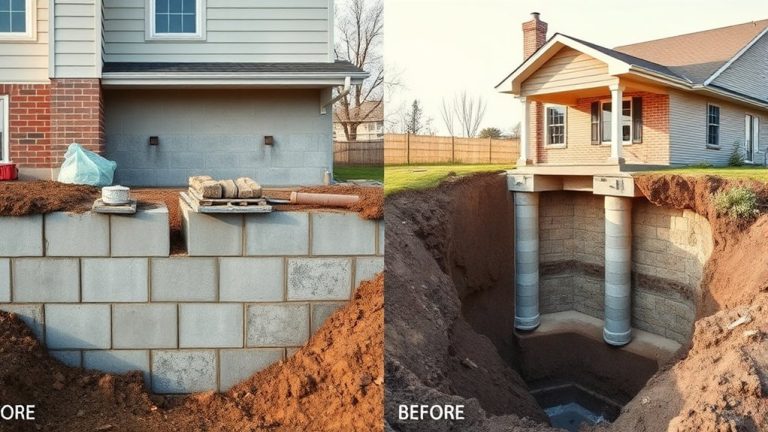Your home's foundation isn't just concrete and soil—it's the critical support system keeping everything above ground stable. Cracks can silently emerge from multiple sources, threatening your property's structural integrity and potentially costing thousands in repairs. Understanding these warning signs early could save you significant stress and money. If you've noticed mysterious lines spreading across your foundation, you'll want to keep reading to reveal the hidden factors that could be undermining your home's most essential structural element.
Key Takeaways
- Soil moisture and temperature variations cause clay-rich soils to expand and contract, creating pressure that leads to foundation cracks and structural weakening.
- Poor drainage and improper terrain grading can direct water toward foundations, causing erosion, water damage, and creating vulnerabilities in concrete structures.
- Underground plumbing leaks and groundwater intrusion gradually compromise foundation integrity by seeping through small cracks and expanding structural weaknesses over time.
- Thermal cycling and extreme temperature fluctuations cause concrete to expand and contract, pushing against foundation walls and creating persistent structural stress.
- Construction design flaws like inadequate soil compaction, insufficient footings, and poor reinforcement techniques can create uneven ground settlement and foundational instability.
Soil Settlement and Expansion
When your home's foundation begins to shift, soil settlement and expansion can often be the underlying culprits. Ground shifting forces can cause significant stress on your home's structural integrity, creating unpredictable soil expansion patterns that compromise your foundation.
Different soil types react uniquely to moisture and temperature changes, which means clay-rich soils are more prone to dramatic volume changes. These fluctuations can push against your foundation walls, creating pressure that leads to cracks and structural weakening.
Understanding these fluid characteristics helps you proactively protect your home's foundation and prevent costly repairs. Foundation repair experts in Syracuse, NY recommend professional assessment and targeted solutions to address soil-related foundation challenges.
Poor Drainage and Water Damage
Poor drainage can quickly become a homeowner's nightmare, causing extensive water damage to your foundation. Improper grading around your house can direct water towards your foundation instead of away from it, creating serious risks. Concrete sealing techniques can provide an additional layer of protection against water infiltration and potential foundation damage.
Without adequate waterproofing, moisture seeps into foundation walls, weakening structural integrity and causing cracks. You'll want to guarantee your terrain slopes away from your home, with at least a six-inch drop over ten feet. Installing proper gutters and downspouts can also help manage water flow, safeguarding your foundation from potential water-related damage and costly repairs.
Climate and Temperature Fluctuations
While water damage presents significant challenges, temperature variations can equally threaten your foundation's structural integrity. Thermal cycling causes concrete to expand and contract, creating microscopic stress points that gradually weaken your home's base.
Ground heaving, a process where soil dramatically shifts with temperature changes, can push against foundation walls, causing subtle but persistent pressure. These environmental forces aren't just theoretical—they're real risks that can compromise your property's stability. Understanding these fluctuations helps you proactively protect your investment, potentially saving thousands in future repair costs.
Plumbing Leaks and Underground Water Issues
The silent menace of underground plumbing leaks can gradually erode your foundation's structural integrity, causing damage that often goes unnoticed until significant problems emerge. Sewage backup issues and groundwater intrusion problems can weaken your home's foundation, leading to costly repairs.
If left unchecked, water can seep through small cracks, expanding them and creating larger structural vulnerabilities. Regular inspections and prompt repairs are essential in preventing extensive damage. By addressing plumbing leaks early, you'll protect your home's foundation and avoid potentially expensive reconstruction efforts that could drain your financial resources.
Construction and Structural Design Flaws
Structural Achilles' heels can secretly compromise your home's foundation stability through inherent structural design weaknesses. Poor construction choices can silently undermine your property's long-term integrity.
Key foundation vulnerabilities include:
- Improper site preparation leading to uneven ground settlement
- Inadequate footings creating unbalanced structural support
- Substandard soil compaction techniques
- Insufficient reinforcement during concrete pouring
- Overlooked drainage design considerations
These design flaws can revitalize your foundation from a solid base into a potential structural liability. Understanding these risks equips you to proactively address potential problems before they escalate into costly repairs, ensuring your home remains a safe and stable sanctuary.
Tree Roots and Landscaping Impact
Beyond construction design challenges, homeowners face another silent threat to foundation stability: landscaping and tree root systems. If you've got trees near your home, their roots can wreak havoc on your foundation. They'll seek moisture and nutrients, often expanding underneath concrete slabs and causing significant structural damage.
Improper grading and inadequate mulching can worsen these issues, allowing roots to penetrate deeper and create pressure against foundation walls. You'll want to strategically plan your landscaping, maintain proper drainage, and consider root barriers to protect your home's structural integrity and prevent costly repairs.
Age-Related Foundation Deterioration
While foundations naturally age and deteriorate over time, homeowners can proactively manage this inevitable process by understanding key deterioration factors. Structural integrity loss becomes more pronounced as concrete ages, potentially compromising your home's stability.
Key age-related foundation challenges include:
- Microscopic concrete degradation
- Natural material shrinkage
- Chemical composition changes
- Increasing surface porosity
- Progressive stress accumulation
Your foundation's longevity depends on recognizing these subtle shifts. Regular inspections and timely maintenance can dramatically slow down age-related deterioration, preserving your home's structural health and preventing costly repairs down the line.
Frequently Asked Questions
Can Foundation Cracks Always Be Repaired, or Are Some Irreparable?
Not all foundation cracks are irrepairable, but you'll need to assess permanent damage and underlying issues. Some require professional intervention, while others can be DIY-fixed with the right skills and tools.
How Much Does Professional Foundation Crack Repair Typically Cost?
Foundation crack repairs typically cost $500 to $3,000, depending on severity. You'll want to compare professional quotes and understand the cost breakdown for different repair techniques that'll restore your home's structural integrity.
Do Homeowners Insurance Policies Usually Cover Foundation Crack Repairs?
You'll want to check your policy's coverage limits carefully, as most insurance claims for foundation cracks depend on the specific cause. Don't assume you're automatically covered; review your policy's details and exclusions.
Will Small Foundation Cracks Always Lead to Serious Structural Damage?
Small foundation cracks don't necessarily spell disaster. Minor settlements and inadequate drainage can cause them, but you'll want to monitor and address potential issues before they escalate into major structural problems.
When Should I Hire a Professional Versus Attempting DIY Repairs?
You'll want professional help if you see major signs of structural issues or can't pinpoint crack causes. The cost of professional inspection beats potential massive repair expenses later.



